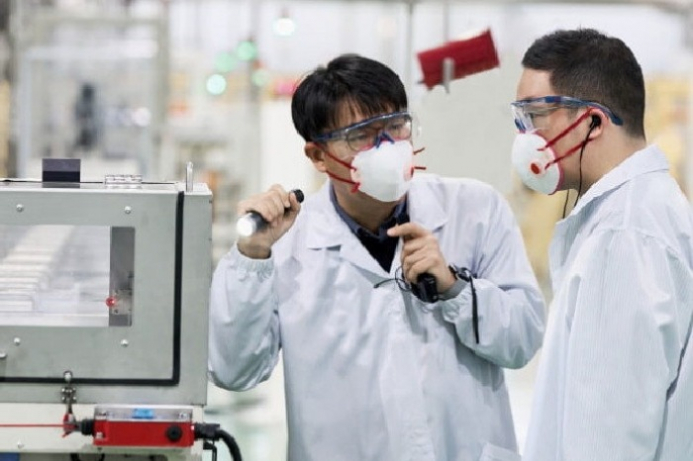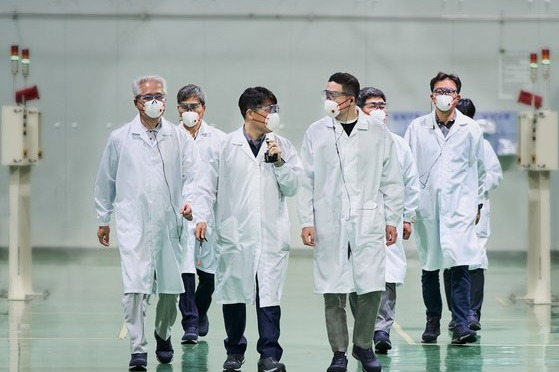Batteries
LG Chairman to refine strategy for EV battery production
Koo Kwang-mo visited the cathode plant in Cheongju and reviewed supply chains ahead of his attendance at Korea-US summit
By Apr 18, 2023 (Gmt+09:00)
3
Min read
Most Read
S.Korea's LS Materials set to boost earnings ahead of IPO process


Samsung shifts to emergency mode with 6-day work week for executives


NPS to commit $1.1 billion to external managers in 2024


HD Hyundai Marine IPO sees strong demand from retail investors


Korean battery maker SK On expects business turnaround in H2



Koo Kwang-mo, chairman of South KoreaŌĆÖs fourth-largest conglomerate LG, visited a cathode plant on Monday to review supply chains for the battery ingredient and refine production strategies, in preparation for his attendance at the Korea-US summit later this month.
ŌĆ£Cathodes are a key foundation and future growth driver for our battery business. We will continue to build on our leadership position in the global cathode market,ŌĆØ Koo said during his visit to the facilities in Cheongju, southwest of Seoul.
Cathode, a key ingredient for rechargeable batteries, makes up around 40% of the cost of electric vehicle batteries.
As LGŌĆÖs centerpiece for the battery supply chain, the Cheongju plant produces high-nickel NCMA cathodes, made of nickel, cobalt, manganese and aluminum, that increase power output and enhance stability. LG aims to manufacture 70,000 tons of cathodes at the factory this year, enough to power 700,000 units of pure electric vehicles.
GLOBAL EXPANSION OF CATHODE PRODUCTION
LG Chem, the parent of the worldŌĆÖs second-largest battery maker LG Energy Solution Ltd., is ramping up its cathode production globally.
The top chemicals firm in Korea manufactures 120,000 tons of cathodes per year. When the production line in Gumi, North Gyeongsang Province starts operation this year, the annual capacity will increase to 180,000 tons by 2024, which can power about 1.8 million EVs.

LG Chem also signed a memorandum of understanding with the Tennessee state government last November to build a $3.2 billion cathode plant in the state, its first factory for the battery component in the US. The plant will produce up to 120,000 tons of cathode a year by 2027, enough to power 1.2 million pure EVs.┬Ā┬Ā┬Ā┬Ā
The chemicals firm will also build precursor production facilities, a key battery component created by mixing nickel, cobalt and manganese. The company will sign an MOU with ChinaŌĆÖs Zhejiang Huayou Cobalt Co. on April 19 to inject 1.2 trillion won ($911.2 million) for a precursor factory in Saemangeum Industrial Complex in Gunsan, southwest of Seoul.┬Ā ┬Ā
With such investments, LG Chem will raise the annual revenue from the lithium-ion battery material business from 5 trillion won last year to 20 trillion won by 2027.
In the long term, LG Group aims to strengthen the supply chains that connect LG Chem's precursors and cathodes to the batteries of LG Energy Solution, the worldŌĆÖs second-largest EV battery maker.
CHALLENGES FROM GLOBAL EV BATTERY MARKET
Meanwhile, LG faces growing concerns about its battery supply chains as the US Inflation Reduction Act (IRA) requires a certain percentage of critical minerals used in EV batteries to come from the US or its free trade partners.
The European Union also unveiled the Critical Raw Materials Act (CRMA) last month, which aims to ensure the blocŌĆÖs access to critical minerals necessary to meet its target of net zero by 2050 with its reduced reliance on ChinaŌĆÖs supplies.
The LG Chairman is visiting the groupŌĆÖs battery plants worldwide to refine the company's supply chain strategy. Last October, he visited LG Energy SolutionŌĆÖs battery plant in Poland and an Ohio-based factory of Ultium Cells LLC, the joint venture between the Korean battery maker and the General Motors Company.
Write to Ik-Hwan Kim at lovepen@hankyung.com
Jihyun Kim edited this article.
More to Read
-
 BatteriesLG Chem, ChinaŌĆÖs Huayou Cobalt to build $923 million precursor plant
BatteriesLG Chem, ChinaŌĆÖs Huayou Cobalt to build $923 million precursor plantApr 14, 2023 (Gmt+09:00)
4 Min read -
 Chemical IndustryLG Chem teams up with US company to expand bioplastic global business
Chemical IndustryLG Chem teams up with US company to expand bioplastic global businessApr 13, 2023 (Gmt+09:00)
1 Min read -
 EarningsLG EnergyŌĆÖs Q1 profit soars on gains from US battery tax credits
EarningsLG EnergyŌĆÖs Q1 profit soars on gains from US battery tax creditsApr 07, 2023 (Gmt+09:00)
2 Min read -

-
 BatteriesLG Energy tops global EV battery market excluding China
BatteriesLG Energy tops global EV battery market excluding ChinaApr 03, 2023 (Gmt+09:00)
1 Min read -
 Chemical IndustryLG Chem breaks ground on supercritical pyrolysis plant
Chemical IndustryLG Chem breaks ground on supercritical pyrolysis plantMar 30, 2023 (Gmt+09:00)
1 Min read
Comment 0
LOG IN


